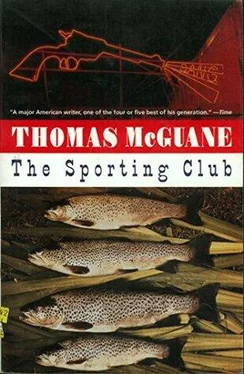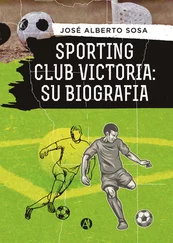“No!” crabbed the prostrate, speckled Stanton from the bed Quinn had occupied so recently. “We cannot.” Quinn noticed the sharply proprietorial air of Stanton now drawing beneath his chin the edge of the thick tan blanket and reclining like a stone mortuary figure. It appeared to Quinn that there would be the matter of his finding another place to stay and recuperate because he would not fight for the bed. Still, he felt, completely apart from the events themselves, that he’d been had. Stanton was speaking: “… I said to the man invisible in the dark but doubtless either Olive himself or one of his henchmen, said as clearly as I could, ‘Shoot if you must this old gray head’ and BOWANGO! they ripped into me with a raking broadside! Whiskey.” Janey gave him the bottle from under the window seat and a glass. “What about rubbing alcohol for the afflicted areas.”
“There is none.”
“None? Why not?”
“There never was any—”
“Use it up on Quinn?” he laughed through locked teeth. “What the Christ, every man should have a fifth column in his home. I’m as moderne as anybody. But for God sakes, if a man is to go to the wars he ought at least to be left his medicine. I would think the subject was treated in international agreements.”
Aggressive and ironic, Quinn never knew how to meet this line of Stanton’s. Anyone who sat silent and unobjecting was a victim; anyone who retaliated, a spoilsport, humorless. Quinn, neither one, floated in uncomfortable liberty. “May I sleep downstairs?” he asked.
“Absolutely, absolutely.”
“In the morning, I’ll go to my own place.”
“You be the judge of that. However, don’t count on Janey for any services. She’ll be right busy, understand?”
Quinn wouldn’t even answer this one. He knew that unless he deferred to Stanton on a kind of yassuh-boss basis, it would be necessary to make a run for it to his own house. One look at Stanton’s perforated dorsal, rendered painless though it was through subjugation to larger lunacies, made Quinn fear such a dash and he hesitated before picking up his grip and telling Stanton what a shit-ass he was.
“Scurrile,” replied Stanton. Quinn shot his eyes to Janey, apologetic for his childishness. Her hands and crisscrossed fingers lay in her lap exactly as they had in the photograph of the Cotton Bowl game.
“Let me know,” she said with contrition and more helplessness, “if there is anything I can do. At all.”
“Fine. Thank you. I think I’ll be going to my place.”
“Back to the house is it?” Stanton inquired.
“If I can.”
“You can do it.”
“What’s that?”
“Go back to your house. You can do it.” Stanton’s eyes flickered beneath heavy lids.
“I said that I would. Weren’t you listening?”
“Moral support was all I could offer. I can’t carry you home now.”
“Stay downstairs, why don’t you,” Janey suggested. Quinn wanted to and would have if Stanton’s face swollen with smugness hadn’t challenged even that amenity.
“Drink your Bosco,” Stanton called. “Bye-bye.”
Leaving the house at all, required a couple of familiar ploys. He whistled conspicuously behind the closed porch door a moment and opened it thrusting an overcoat and hat on a broomhandle into the space. These objects were not fired upon and Quinn went on his way home. He went directly through on the path, and around him the tree trunks stood like the ribs of a sunken ship, their spaces exaggerated by the clear moonlight. He stopped. He had no desire to return to his empty house. After the proximity of Janey, the steady sound of their voices still in his mind, the thought of the empty wooden building seemed depressing to the point of being ominous. He began to head crosslots toward the compound. In a moment, he came to the lake and walked to its edge. The sun had baked away much of its foul odor. There was nothing to encourage Quinn’s memory. Even the dock, still standing, seemed unfamiliar. Before, it had lain inches above the unfluctuating surface of the lake; now it towered high on its pilings above half a dozen canoes sprawled morbidly below. Quinn walked on till he came to Stanton’s cutter. He ran his hands over the high runners and tested the flexion of its double-sprung seat with his hand. Then he wandered out onto the lake bed. Long aquatic weeds were stretched upon its surface and dried fast; they looked like the silhouettes of trees and in the moonlight retained a green pallor. The lake bed itself was dried out and its surface deeply fissured, lunar and dead. On a plateau behind the far edge of the lake, Quinn perceived the glow of the club’s lights and made for them. About midway, he came upon the horse, stretched out as Stanton had said, like an arrow: head reaching, legs trailing. The bones were white, almost luminous in the moon, and among the ribs, which stood up far higher from the lake floor than the rest of the skeleton, were metal harness fittings. Quinn sat astride the skeleton, smiling bleakly, and his legs outstretched in front of him as though he were on some outlandish Flexible Flyer; he gripped the short ribs in his hands and could see before him the barrel of the rib cage like white slats in the moonlight, trailing to the single heavy whiteness of the skull which, stretching forward from the streamlined limbs, made Quinn feel already that he was in motion; so much so that when he tilted his vision slightly above the treetops he lost all reference and the stars streamed behind like foam; he unconsciously tightened his grip on the ribs and let his head fall back so far that his mouth opened and the velocity of the stars increased until they overtook themselves in a whitening that became the moon. Quinn tilted his head down to the steadying serration of trees and got up. He crossed the lake bed to the plateau beyond. He went a very short distance from the edge of the plateau and found himself looking down at the unpleasant ventilation sleeve of an automatic rifle. The muzzle and front sight of the weapon were pressed invisibly into his belly. “It’s you, Quinn,” said Spengler, withdrawing the gun.
“What is this?”
“I’m on sentry.”
“Is that loaded?”
“Of course it’s loaded.”
“For what?”
“It’s loaded to shoot. What do you think it’s loaded for? What do you load a gun for?”
“I don’t.”
“Sure you do. What d’you mean? Everybody loads a gun.” Quinn looked at Spengler’s harmless, unlined face, flush with craziness, and asked him how the sentry duty was being administered. Spengler laughed at this word. Fortescue, he said, would point a finger: you’re it. It wasn’t, Spengler insisted, the fairest thing in town. The snivel had become recognizable. “A big boy like you,” Quinn said and thought Spengler would break down.
“Lay off,” he said. Quinn ignored him.
“Well, what’s the plan? Is anybody ever going home?”
“When we clean up here, I guess. When we celebrate the centennial and dig up the time capsule and take care of the Olives—” What did taking care of them mean? Did it mean turning them over to the law as it did not seem to mean? Or did it mean something more direly in the vigilante line? It was too easy to picture Lu, the fat girl, the motorcyclist and their companions, all in a line that began with Olive, strung up on a limb down in the swamp they now inhabited. “What do you mean by taking care of them?”
“I — don’t — know.” Spengler stood firmly by his ignorance. No one ever knew about such things; not completely; maybe a little; enough of them knowing a little but not completely and you had the deed without the consequences; that’s right, gentlemen, no hangover, no morning after. “Quinn, do yourself a favor and get out, would you?”
Читать дальше












